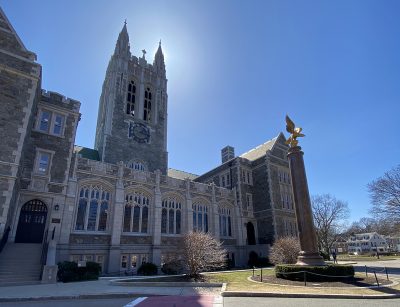
By: Jit Ping Lee
College students across the United States returned to campus this fall in what is set to be a test on the power of COVID-19 vaccinations and testing.
Five universities in the Boston area require both COVID-19 vaccination mandates and at least weekly testing to manage the spread of COVID-19 in their school communities. These colleges include Boston University, Harvard University, Northeastern University, Massachusetts Institute of Technology and Tufts University.
University of Massachusetts Amherst also has a vaccination mandate in place but updated their testing policy Sept. 22 from only requiring UMass community members with vaccination exemptions to test weekly to requiring all members who have been exposed to or develop symptoms of COVID-19 to get tested.
Boston College has a similar policy requiring weekly testing for only certain “high-contact” groups designated by the school, but does require COVID-19 vaccinations.
While Boston’s seven-day moving average for positive COVID-19 tests stands at 4.1% as of Sept. 14, six of the seven schools reported COVID-19 test positivity rates lower than 1%. UMass Amherst has a seven-day positive COVID-19 rate of 4.2% as of Sept. 16.
These numbers come despite an over 90% vaccination rate for six of the seven schools — Tufts University does not provide public information on their vaccination rates — a figure significantly higher than the 63.7% achieved by the City of Boston.
However, the prevalence of the highly transmissible Delta variant, which recently accounted for 99% of all COVID-19 infections in the United States, means vaccination protects people from “getting serious disease and dying,” associate professor of public health and community medicine at Tufts University, Paul Beninger, said.
Beninger said the danger with outbreaks of COVID-19 in a highly vaccinated community is the threat of infection to unvaccinated individuals.
“There’s still a risk with this Delta variant,” he said. “Risk is significantly worse for people who aren’t vaccinated.”
The University of Massachusetts Amherst saw 371 COVID-19 cases the week of Sept. 8 — significantly greater than the 149 cases detected a week before.
“The outbreak is connected to off-campus social activities, such as going to crowded bars and indoor parties,” Mary Dettloff, deputy director at the school’s office of news and media relations at UMass Amherst, wrote in an email. “At this time, our positive cases seem to be falling.”
University administrators have continued to adjust COVID-19 policies based on surveillance testing figures. Tufts University recently detected a spike in their test positivity rate, with the 7-day moving average of 0.39% notably higher than their baseline of 0.15% for all tests conducted since August 2020.
“We have seen an increase in COVID-19 cases among students and are watching the situation closely,” Patrick Collins, executive director of media relations at Tufts University, wrote in an email.
In an email update sent to all undergraduate students Sept. 14, Tufts University administrators outlined new guidelines such as increasing the frequency of surveillance testing for undergraduate students to twice weekly.
Noting that students generally have a huge number of contacts, Beninger said testing twice weekly can “significantly” reduce the number of people a positive individual could have potentially exposed.
“Once a week is probably, at this point, not frequent enough,” he said. “If you come in Monday and then you don’t come back again till the following Monday … you could have exposed any number of people in those five days.”
Ultimately, this boils down to a question of how schools prioritize resources used in managing COVID-19 and providing for other core academic functions, Ben Linas, infectious disease physician at Boston Medical Center, said.
“There is no one right answer because both these things are important,” Linas said. “Then maybe the approach should also be different and maybe we can save some of these resources [on testing] and instead use them to provide more classes or hire more professors.”
Linas encouraged all colleges that have not implemented a vaccine mandate to do so.
“Once everyone in your community is vaccinated, then maybe the metrics can shift because we have to be clear about what we are trying to prevent,” Linas said.
Beninger advised students to continue practicing vigilance as the school term continues.
“It means recognizing that there is still a virus out there,” said Beninger. “You still have to recognize that you’re part of a community, and you need to continue to protect other people by wearing a mask and minimizing your social contacts.”




























































































































